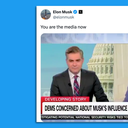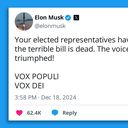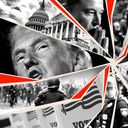Government shutdown fight captures difference between media and reporting
This week's epic fight over funding the government captures the power — and flaws — of the new information ecosystem.
Why it matters: Elon Musk and his followers on X proved they dominate the Republican media industrial complex — using a digital revolt to kill a spending bill, and open the door to a government shutdown. That revolt was powered by some false information, tweeted with total self-certainty.
"We aren't just the media here now. We are also the government," Donald Trump Jr. tweeted yesterday to his 13 million followers.
- MAGA's online army now can assess "information rapidly & pressure our representatives to act in a manner that actually represents what we want," Don Jr. added. "They can't hide and do the bidding of swamp oligarchs anymore."
🖼️ The big picture: This reality highlights the difference between media (what people consume) and reporting (a set of standards for pursuing fact-based information). In the new world order, media and reporting are tossed together with a mix of truth, opinion, and nonsense.
- This helps explain the confusion that engulfs almost every real-time topic, from drones in the New Jersey skies to whether billions were stuffed into a spending bill for a new D.C. football stadium. (The bill banned the use of federal funds for the stadium.)
💡 Truth bomb: This is your present and future, and little can be done to stop it. A fragmented media means fragmented truths and standards.
- The winners are those who control the flow of information to the largest numbers of people — or the right people at the right moment on the right topic. Right now, Musk controls both for the incoming governing party.
This allowed Musk to tweetstorm (150+ posts) the defeat of the federal spending bill, while sharing some demonstrably false information — including the size of a proposed congressional pay raise (now dropped from the bill).
- Musk also reposted a false claim that the bill included $3 billion for a new NFL stadium in D.C. But the provision, also now stricken from the bill, merely transferred the site of the old RFK Stadium from the federal government to the District of Columbia.
- Musk said the original bill funded a bioweapons lab. It didn't.
- Musk reposted a claim the bill contained $60 billion for Ukraine, which it didn't appear to.
So when Musk tells X followers "You are the media," it's true they're part of his media. But that's different than declaring they're all reporters, trying to validate information before sharing it.
- That puts even more pressure on you as a news consumer to discern what and who you can trust for reliable, actionable information. It demands skepticism and patience when hot news hits fast.
- You need to be skeptical of people or sources unless you feel confident they routinely get it right. You need to be patient in not overreacting to — or oversharing — stories that hit your dopamine button.
A similar burden now falls on businesses, where big strategic decisions are shaped by evolving events. Discerning reality will get harder, as will discerning the scale of micro-movements that quickly become macro-movements — or disintegrate instantly.
- Finally, as we've written before, it puts pressure on media companies like Axios to up our games by winning and keeping trust — offering clarity in moments of confusion, and reporting clinically not emotionally.
🛸 Case in point: New York Times columnist Zeynep Tufekci, a Princeton professor who wrote a book about Twitter and social movements, found a 70-year-old parallel with the New Jersey drone craze. In 1954, an epidemic of car owners in Washington state reported pits in their windshields that they feared could be caused by vandals ... or even H-bomb tests. The Seattle mayor sought presidential intervention.
- The Seattle police crime laboratory determined that the damage reports stemmed from 5% "hoodlum-ism" and 95% "public hysteria."
- "In the Seattle windshield panic," Tufekci wrote, "mainstream media outlets amplified people's panic. In the internet age, ordinary people can perform that service."
🗞️ Context: Newspapers long were the natural home of great investigative reporters. But the pandemic expedited cuts to newsrooms.
- Axios Media Trends author Sara Fischer points out that as news organizations scrambled to survive, investments that would've gone to hiring more reporters went to establishing audiences on TikTok and other new platforms, or making content for streamers.
More local news outlets were forced to pull back or shutter, removing accountability coverage for thousands of U.S. counties.
- Most places around the country that saw their newspapers shutter still haven't gotten replacements. Those communities are relying on TikTok for news. Studies have shown that when a local community loses a legitimate news source, there's a huge spike in wasteful government.
🔮 What we're hearing: Trump insiders tell us this week's X revolt was just the beginning.
- "The problem Congress faces," a Trump transition source says, "is that Elon now has an army of people reviewing every word of every bill — and he's gonna amplify the crazy sh*t in there. So until they come up with a bill without a lot of crazy sh*t, the government will stay shut down."
Axios' Sara Fischer and Noah Bressner contributed reporting.



















